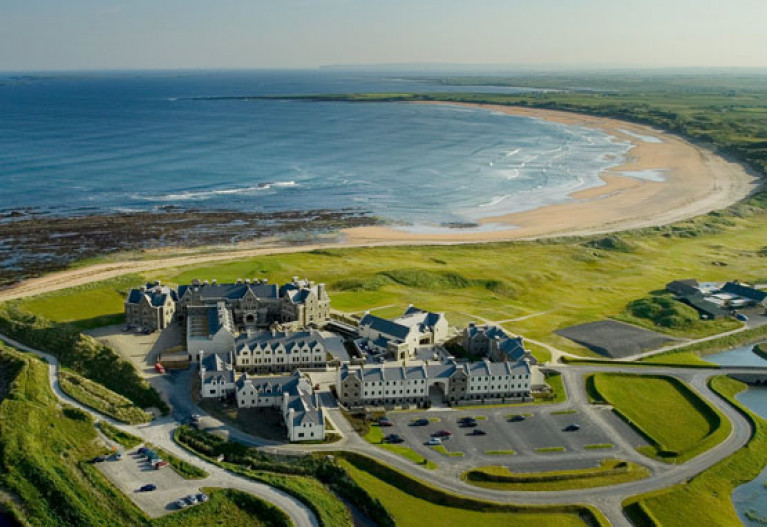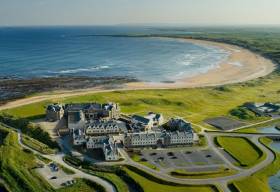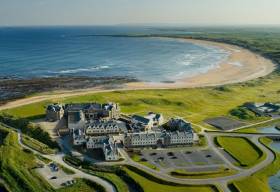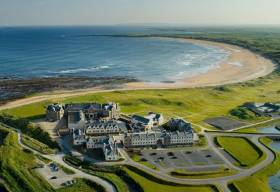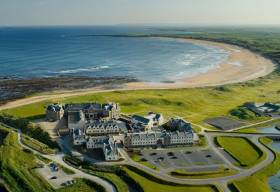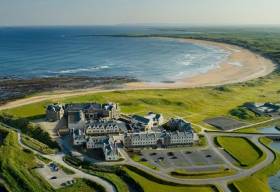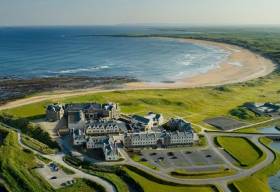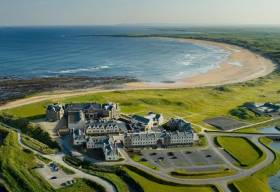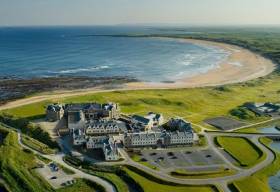Displaying items by tag: Donald Trump
Trump’s Doonbeg Golf Resort Warned Over ‘Unauthorised’ Fences
Former US president Donald Trump’s golf resort in Doonbeg has been warned by the local authority over what it claims to be an unauthorised fencing erected at the property.
According to TheStory.ie, which has more details on the story, Clare County Council wrote to the Trump International Golf Links & Hotel in September after an assessment identified two fences in the dunes at Doughmore Beach for which it said permission had not been sought.
The news comes more than two-and-a-half years after the golf resort, which is Doonbeg’s largest employer, was refused planning permission for a ‘sea wall’ of coastal defences.
As previously reported on Afloat.ie, planners were not satisfied that the installation of rock armour to arrest coastal erosion at the golf links would not adversely affect the Carrowmore Dunes Special Area of Conservation.
The Doonbeg golf resort owned by US President Donald Trump has been refused permission to build a ‘sea wall’ of coastal defences, as RTÉ News reports.
An Bord Pleanála’s decision published on Wednesday (18 March) said planners were not satisfied that the installation of rock armour to arrest coastal erosion at the Co Clare golf links would not adversely affect the area’s Carrowmore Dunes.
The works were given the go-ahead by Clare County Council in late 2017 but faced a raft of objections from surfers to environmentalists who feared an adverse impact on various aspects from local wave conditions to protected wildlife and plantlife.
The Trump International Golf Links & Hotel is Doonbeg’s largest employer, and expansion of the site — with a new ballroom and leisure facilities and holiday homes — had been put on hold pending he decision on the coastal works.
RTÉ News has much more on the story HERE.
‘NIMBY’ Planning Activist Lodges Appeal Against Doonbeg’s Trump Wall
#Doonbeg - US President Donald Trump’s sea wall proposal for Doonbeg has hit another stumbling block — this time from a planning activist who’s turned his attentions to the controversial plans.
As TheJournal.ie reports, Peter Sweetman has lodged an appeal against last month’s decision by Clare County Council to green-light revised proposals for coastal erosion works alongside the Trump International Golf Links at the Co Clare coastal village.
The reduced scale of the project met with council planners’ approval but not that of surfers and some local residents who fear its impact on Doonbeg’s surfing conditions and unique natural habitat — a cause that Sweetman now supports.
Considered ‘Ireland’s foremost objector to energy projects’ by The Irish Times, Sweetman is also known for his campaigning against the Corrib pipeline and large road projects, as well as being son of former Finance Minister Gerald Sweetman.
The self-professed ‘NIMBY’ claims his appeal is not a personal objection but only “is about the Habitats Directive, the law and Doonbeg golf course”.
TheJournal.ie has more on the story HERE.
Doonbeg’s Trump Wall Gets Go-Ahead From Clare Council
#Doonbeg - Clare County Council has granted permission for coastal erosion works adjacent to the Trump International Golf Links in Doonbeg, as RTÉ News reports.
Planners at the council approved a revised proposal from the golf resort for works comprising two backstops running for a total of a kilometre in the dunes bordering the course.
The resort, purchased by Donald Trump before he became US President, has promised that these coastal erosion management works would be hidden from view and would preserve access to the beach “as exists today”.
But surfers and other concerned parties fear for the sea wall’s impact on the area’s unique surfing conditions and natural habitat, as previously reported on Afloat.ie.
The decision may be subject to a first or third-party appeal An Bord Pleanála within the next four weeks. RTÉ News has more on the story HERE.
Surfers Lead Concerns Over Trump Wall In Doonbeg
#Doonbeg - Irish surfers have reiterated their concerns over proposed coastal defence works at US President Donald Trump’s golf resort in Doonbeg.
TheJournal.ie reports that submissions from surfing groups are among dozens from environmental groups and some local residents to Clare County Council over long-mooted plans for a coastal rock barrier alongside the golf course.
Afloat.ie reported in August that a final say on the controversial rock wall plans had been delayed after the golf resort downscaled its original plans for a 3km sea wall. The council is now expected to make its decision before the end of this month.
The resort’s revised “coastal protection” proposal would stretch some 600m south and 250m north of Doughmore beach, hidden by sand and cobbles and preserving access to the beach “as exists today”.
But surfers maintain that any works on the coastline would affect surf conditions that have been enjoyed “for generations” by accelerating erosion in those parts not protected, according to the West Coast Surf Club based in Lahinch.
Other submissions repeated concerns over the potential impact to the beach’s ecosystem, which includes a rare species of snail.
TheJournal has much more on the story HERE.
#Doonbeg - Clare County Council’s decision on the controversial rock wall planned for the Trump golf resort in Doonbeg has been delayed till early next year, as the Clare Champion reports.
It follows the granting of a three-month extension requested by TIGL Ireland Enterprises, owned by the family of US President Donald Trump, to respond to a list of requests for information regarding plans to build a 3km coastal rock barrier.
The proposed coastal defence works for holes 1, 9 and 18 on the course, revised from a larger-scale plan late last year, prompted more than 30 submitted objections from environmentalists, surfers and some local residents in the public consultation that closed this past February.
Moreover, concerns remain within the local authority regarding the sea wall’s potential impact on the beach and dunes as well as the adjacent Special Area of Conservation, home to a rare species of snail.
Trump International Golf Links, purchased by the property tycoon before he became US president, is the Doonbeg area’s single biggest employer and has the support of most locals, as previously reported on Afloat.ie.
The Clare Champion has much more on the story HERE.
Opposition Remains Strong To Doonbeg Coastal Defence Plans
#Doonbeg - More than 30 individuals and organisations have submitted objections to the proposed coastal defence works at the Doonbeg golf resort purchased by US President Donald Trump.
Surfers, environmentalists and some local residents comprise the stanch opposition to the plan among submissions received in a public consultation that closed on Friday 3 February, according to the Irish Examiner.
December saw news that the original proposal for a near 3km sea wall had been scaled down to just three holes on the Co Clare links course, part of a resort that constitutes the area’s single largest employer and has the support of most locals.
However, the revised plan to protect holes 1, 9 and 18 from coastal erosion remains controversial as it involved the placing of 38,000 tonnes of rock between the course and the sea — a project that could interfere with popular surfing waves, not to mention the habitat of a rare snail species.
One complainant wrote of the “monstrous damage” to the beach that its claimed would result from the rock barrier works — and suggested that the “simple solution” of moving the golf course further inland had been ignored.
The Irish Examiner has more on the story HERE.
Trump Golf Resort Scales Down Doonbeg Coastal Defence Plans
#Doonbeg - US president-elect Donald Trump has abandoned plans for a near 3km sea wall at his golf resort in Doonbeg, as The Irish Times reports.
Despite local support for the scheme in the Co Clare village, the proposed coastal defences were recently the subject of social media protest prompted by environmental concerns from conservationists and surfers alike.
The controversial plans also faced obstacles in approval by the local authority over the delicacy of Doonbeg’s dune habitats, home to a protected rare snail species.
The resort’s operators had previously indicated that the future of the locality’s single biggest employer would be in doubt should the coastal defence works be blocked.
But now the Trump International Golf Links & Hotel Doonbeg has announced it is instead seeking a smaller-scale proposal to protect erosion-prone sections at just three holes on the links course.
The Irish Times has more on the story HERE.
Trump's Doonbeg Sea Wall Faces Social Media Protest
#Doonbeg - Donald Trump's plans for a defensive sea wall at his Doonbeg golf resort face renewed protest via an international social media campaign, as The Irish Times reports.
#NatureTrumpsWalls is the name of the campaign run in tandem by Save the Waves and Friends of the Irish Environment to bring attention to the threat against "one of our finest dune systems", according the latter group's Tony Lowes.
US presidential candidate Trump's plans for nearly 3km of coastal defences at the golf resort he purchased in February 2014 were stymied over the summer when the Government blocked an attempt to circumvent protections on a stretch of the Co Clare coast that's home to a rare snail species.
The Doughmore Beach area is also popular with surfers, who fear that a sea wall would interfere with wave and sediment patterns. Their concerns are shared in the community north of Doonbeg, where continued public access to the beach has been questioned.
However, the people of Doonbeg itself have overwhelmingly backed the billionaire businessman's plans for the golf links that represent the single biggest economic asset in the coastal village.
The Irish Times has more on the story HERE.
#Doonbeg - Controversial proposals for coastal defence works at Donald Trump's Doonbeg golf resort have not been proved necessary, according to the Department of Arts, Heritage and the Gaeltacht.
As The Irish Times reports, the department's submission to Clare County Council makes note of the "complex mosaic" of Doonbeg's dune habitats, a Special Area of Conservation and home to a protected rare snail species, suggesting that any physical interference by way of a rock wall or 'berm' would result in shifting sands and other significant changes.
“The case has not been made to prove that the rates, patterns and causes of erosion at the site warrant the type and scale of the solution proposed," the submission adds.
Earlier this month Doonbeg residents came out overwhelmingly in favour of the coastal defence works, which Trump's representatives say are required for the continued operation of the resort the property tycoon and US presidential hopeful purchased in February 2014.
The 2.8km, 200,000-tonne rock barrier is opposed by various groups beyond the Co Clare village, including the local Save Doughmore Beach Protection Group. More on this story in The Irish Times.



























